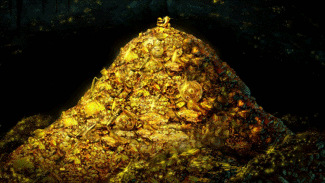Drink the Water (PLOT SUMMARY)by Charles Carreon
June 29, 2017
NOTICE: THIS WORK MAY BE PROTECTED BY COPYRIGHTYOU ARE REQUIRED TO READ
THE COPYRIGHT NOTICE AT THIS LINK BEFORE YOU READ THE FOLLOWING WORK, THAT IS AVAILABLE SOLELY FOR PRIVATE STUDY, SCHOLARSHIP OR RESEARCH PURSUANT TO 17 U.S.C. SECTION 107 AND 108. IN THE EVENT THAT THE LIBRARY DETERMINES THAT UNLAWFUL COPYING OF THIS WORK HAS OCCURRED, THE LIBRARY HAS THE RIGHT TO BLOCK THE I.P. ADDRESS AT WHICH THE UNLAWFUL COPYING APPEARED TO HAVE OCCURRED. THANK YOU FOR RESPECTING THE RIGHTS OF COPYRIGHT OWNERS.
Whoever drinks the water I give them will never thirst.
-- John 4:14
A virus appears with an unusual post-infection side-effect: the inability to observe or commit acts of physical violence. A young reporter, Jason Reckoner, is assigned to interview Patient Zero, Lucinda Washington of Holmesburg, Pennsylvania, an area of Philadelphia. Reckoner works for MegaMedia and moonlights secretly at his blog, ReckingCrue.com. Throughout the novel, Reckoner experiences tension between his official persona and his blog persona. He always wants to move as much provocative information through the MegaMedia pipeline as possible, but sometimes saves the tastiest bits for his blog.
Reckoner discovers that Lucinda Washington is not really Patient Zero. She got the virus from her prison guard husband, Walter Washington, who in turn believes he got the disease from a prison lifer with whom he developed a friendship and spent a good deal of time talking while on duty at the prison. Reckoner comes to suspect that the true source of the disease may have been experiments performed on prisoners at the Holmesburg Prison without informed consent, a matter that eventually became a national scandal. However, the health records of Walter Washington appear to have disappeared in the course of his workers-compensations process, and he is satisfied to forget the incident and collect his retirement and disability. Throughout the novel, Reckoner keeps trying to piece together the evidence to publish a story that will establish that the true source of the virus is in fact, the CIA, that was the hidden hand behind the unlawful experimentation.
Lucinda is believed to be Patient Zero by the physicians at the hospital where she was treated, and passed the infection to her co-workers at the HeadStart program where she cooked school breakfasts. This resulted in widespread infections spreading through the schools among students and teachers. Lucinda, not being given to watching violence, did not even really notice the results of the infection, but her coworkers did – experiencing a variety of upsetting experiences due to what came to be called “PVVA,” Post-Viral Violence Avoidance.
Efforts to contain the virus at the front-end are few. Most news outlets find it impossible to take the disease seriously. Reports of PVVA often provoke humorous responses, and it becomes an entertainment story – what movie should you see if your date is PVVA? Should you share popcorn with someone who is PVVA?
Initially, the government policy is to downplay the entire issue, because there is an immediate awareness of the risk that PVVA poses to the military establishment. Eventually, however, politicians ever in need of circus entertainments to distract the public from the continuing outrages of the kleptocratic elite, which it is their daily duty to conceal, get the media to conjure up a crisis. Congress conducts hearings, and Dr. Ricardo Alvarez from the NIHS is called to testify. Dr. Alvarez notes drily that the disease is not lethal, and has caused a net improvement in national health in measurable ways, i.e., reductions in domestic violence and violent assault. Several reactionary Congressmen and Congresswomen blunder into a trap, as Dr. Alvarez begins to reveal the fact that there has been a coverup of the true scope of the virus, which is turning into a genuine epidemic in some parts of the country.
Conservative Congressmen are outraged, and while they are reviling him live on YouTube and Facebook, he resigns, the scene goes viral, and before the live feed is cut by a semi-hysterical committee chair, he has become an enduring icon of resistance. Reckoner connects with Dr. Alvarez, and the two begin a fertile association. It turns out that Dr. Alvarez had planned his mutinous testimony ahead of time, and had already cleaned out his desk and captured all of the official data on the virus from the NIHS databases, along with considerable other scandalous information. Reckoner thus plays Wikileaks to Dr. Alvarez, steadily leaking embarrassing information on ReckingCrue.com, often contradicting the government’s spin du jour with irrefutable evidence.
The first documents Dr. Alvarez provides are interviews of patients that reveal the subjective experience of the virus infection to be widely varied, from nothing more noticeable than a brief head cold and a hacking cough for a few days, to a multi-week ordeal that includes episodes of extreme delirium. It appears, from Dr. Alvarez’s analysis of the data, that the more violence in a person’s history, the more severe the impact of the virus, and the more the sickness appears to resemble a psychedelic trip, replete with confrontations with spirits, bouts of severe regret for past acts of cruelty, and a powerful need to seek forgiveness and absolution.
As ReckingCrew.com releases this information, people with PVVA start to discover each other, and start a website at DrinkinIt.org, where stories are posted. The site grows very quickly, and becomes the basis for many versions of a mushrooming pro-viral movement.
The noises out of DC become more and more paranoid. The DOD gets a billion in funding to develop a vaccine, and there are rumors that not only active duty soldiers will be subjected to forced vaccination, but also that all citizens will be required to submit to vaccination or be interned in FEMA quarantine camps. Numerous “intelligence reports” are circulating, claiming that the virus is a foreign bioweapon. In the emerging McCarthyite atmosphere, accusations of “giving aid and comfort to the enemy” are leveled at those who show “tolerance” toward the pro-viral movement. In response, ReckingCrue.com begins to publish the story of the true origin of the virus in the Holmesburg experiments, and the puppet media responds by branding the story as “fake news.” This story unfolds throughout the novel, with Dr. Alvarez and the staff that defects from the NIHS with him conducting forensic science and investigative work to document the CIA’s culpability in creating the virus. Ultimately, the doctor who created the virus will give a deathbed confession and explain how he believes the virus works.
As governmental repression gets going, it has the opposite effect, giving birth to the Renaissance movement. Emma Williams, a soft-spoken black Tennessee schoolteacher with a disarming smile becomes a charismatic leader of the Renaissance movement after she is forced to resign from her job at an airbase that is the HQ of a huge fleet of surveillance and “anti-terror” drones, that are now deployed around the world. Many of her students were young men and women recruited at an early age from the ranks of top-gun gamer academies sponsored by the military, and had rarely known much mother love. Emma suffers a bad bout of the virus from which she has a hard time recovering. She can’t figure why, since she isn’t actually witnessing any violence, or committing any acts of violence. Finally it comes to her – she is actually picking up the subconscious vibrations of violence emanating from her students, many of whom are engaged in performing live assassination missions in the mistaken belief that they are actually “just training.”
Reckoner’s interview of Emma contains this segment: “Before I got sick, I never thought about what really happens to people on the ground when those drone missiles hit them. I’m sorry, I just must’ve blocked it out, but I swear to you, I never thought about it, and I didn’t think about how those children I was teaching were gettin’ involved in something that serious. They were just kids to me, my kids, and I was doin’ my job helpin’ ‘em to get an education. But after I got sick, it got very strange. I’d be talkin’ to one of ‘em, and these images would start comin’ up in my mind, horrible images of people burning to death inside their homes, children dying in their parents’ arms, all kinds of images that I couldn’t imagine where they were comin’ from. Then it hit me – they were comin’ from my kids – not all of ‘em, but some of ‘em. And when I realized it, I just walked right out of that classroom, got in my car, and drove off that base and never came back. It was like walkin’ out of hell. You don’t go back.”
The DOD vaccine project is declared to be a success, and final stage trials are approved by the FDA. Within a few months, however, severe and disturbing side effects begin to manifest. Most obviously, skeletal growth in the facial area and upper body is restarted, perhaps because of reactivation of the pituitary gland, resulting in unsightly and uncomfortable ridges and protuberances in the face, on the shoulder blades, and in the chest area. The condition comes to be called Klingon-syndrome, and is too obvious to be hushed up. Nevertheless, government doctors declare that this is the price of maintaining military security in the wake of the virus, and promise to improve the vaccine. The program is about to move into the phase of administering the vaccine to the lowest-ranking infantry when Dr. Alvarez’s team secures documents showing that the results have been faked. The vaccine not only causes deformities, it is less than 65% effective in animal tests, and is being pushed by the DOD primarily because the contract will put billions into the coffers of the drugmakers, and make a small number of retired military men rich. The vaccine program goes down for the count, and does not rise again.
The Renaissance movement grows, and Reckoner travels to meet with the Renaissance Communities that are forming around the world. Newly-converted Renaissance People sometimes wander about in “love mobs” that bear some resemblance to the Bacchantes, or Sirens, offering “the Kiss of Rebirth” to anyone who wishes to join their ranks. Renaissance Men and Women are evolving into community health organizations with greater goals than spreading the virus and helping PVVA people to integrate into post-viral life. Community gardens, solar energy collectives, and distributed manufacturing begins to thrive in the Renaissance communities. Post-viral people appear to have diminished jealousy and are more able to collaborate and engage in community activity. Some commentators in the mainstream media take notice, and write complimentary opinions about them, but the McCarthyite mood gripping the elites makes these occasional outbursts of sanity rare, and the speakers are promptly punished. Some of them ultimately convert to the Renaissance cause, abandoning jobs and families to join Renaissance Communities.
As the Renaissance Communities begin to grow, the government begins to fund anti-Renaissance terrorism. Renaissance leaders have to face the daunting challenge of learning how to deal with violence when they are unable to respond with violence. They begin to study Aikido and other soft martial arts, and learn to meditate so that they can face violence without being overcome by the ugliness of it. A new strain of Renaissance warrior begins to emerge in the movement, people who serve as security guards for Renaissance leaders and communities, developing what they call “proactive ahimsa” techniques to protect the non-violent from the violence that threatens.
Congress turns to efforts to frustrate the social movement by defunding it. A bill is passed to disqualify anyone who voluntarily contracts PVVA from receiving Social Security disability income. A sound bite from a reactionary Senator: “We used to court-martial cowards, not give them a pension at public expense. If we can’t eradicate this plague of cowardice, then at least we can stop incentivizing it.” When Renaissance people march in protest, they are attacked by violent thugs, but increasingly, the thugs find themselves unable to make much headway, as the proactive ahimsa techniques prove effective, and sometimes result in converting violent thugs to the Renaissance cause, as they are delivered into the hands of the love mob, and succumb to the Kiss of Rebirth.
Congress can only go so far with its efforts to punish the pro-viral movement, and the agenda-creators and corporate donors direct additional efforts at local governments, that are paid to enact unconstitutional Jim-Crow laws that forbid PVVAs from gathering in groups in public places, and make them guilty of “conspiracy against public order” when they violate these anti-assembly laws. Injunctions that were previously used to combat violent streetgangs are now, ironically, turned against peaceniks who are not breaching the peace, but rather fomenting it. The irony is not lost on social commentators, who ridicule the yahoo legislatures enacting these laws. Local police find the enforcement of these laws to be absurd, and prosecutors resign their jobs rather than put teeth into the letter of the law. Private law firms are hired to take over these persecutions, but the cost of litigating jack-booted laws with white-shoe lawyers is prohibitive. Local politicians are embarrassed by the cost, and run out of office.
The Renaissance Movement becomes legally organized, dignified, and increasingly able to repel physical and legal threats through its proactive ahimsa techniques and legal advisors. Law professors begin to write scholarly articles to critique the wave of unconstitutional laws that have popped up like mushrooms in communities around the country, rather mysteriously, since there was no popular clamor for repression against the Renaissance Movement, aside from the usual Astroturf campaigns. More and more people of principle are rallied to the cause, and a political leader emerges, Congressman Luke Scott from Madison, Wisconsin – young, fiery, the father of a child who caught the virus on a school outing, he approaches the issue with the passion of a zealot, never apologizing, always shining the light of his probing intellect into the dark places where the violence-promoting sickness dwells. His rhetoric turns the tables on those who accuse the Renaissance Communities of sedition. In his lexicon, people who are post-viral are not sick, they have “been healed of the disease of violence.” No vaccine is needed, because “they have been immunized from the fever that causes people to act out their anger.” The accusations ring true in the minds of many, and Scott becomes a lonely voice of conscience in Congress, making the news regularly despite efforts to squelch him, deride him, and topple him from his position. Reminiscent of Ralph Nader in his adherence to moral values that make him invulnerable to bribery and scandal, he rises in the public estimation.
In parallel and in tandem with the Renaissance Communities, a sect of post-viral religious zealots arises, who call themselves “the Walking Wounded.” The “WW’s” as they are popularly known, take the vow to convert every living human on earth to the path of post-viral non-violence, by persuasion if possible, by “loving compulsion” if necessary. WW revivals are led by witnessing converts who tell the story of their changed lives, and pledge themselves to the “Great Vow” in public ceremonies held with the object of evangelizing and converting new believers to the path of non-violence. Their slogan is “Drink the Water,” and all who come up to the altar and drink the sacramental water that has been “blessed” with the virus, are lovingly cared for by the congregation during and after their “Second Birth.”
Josepha Standifer is the living saint who leads the WWs. A powerful, rather imperious figure who has never fully recovered from the virus entirely, she still undergoes periodic resurgences of the active viral illness, which in her case manifests as a flushing of the skin that many people of both sexes find irresistible. She has converted tens of thousands by her direct kiss, and many of them will live nowhere except close to her. As the movement has grown, she has taken to blessing the ceremonial water by moistening her finger in her mouth, and dipping it into the water that is drunk by new converts. In this way, she can bless millions, and has every intention of doing so. Although the WWs are always on the lookout for someone who, like Josepha, remains an active carrier, she appears to be unique, as everyone else who gets the virus eventually recovers and ceases to be an active carrier. Thus Josepha enjoys unique authority among her devotees.
Josepha’s voice to the nation is her son Antonio and his wife Drucilla. They preach from dual pulpits, sometimes finishing each other’s sentences, often joining their voices at crucial moments, night after night bringing hundreds to the altar to drink the blessed water made sacred by Josepha’s bodily fluid. Occasionally, recent converts, young people still in the throes of their viral attack, are brought to the altar and, seized by the spirit of Josepha, administer the ceremonial kiss, but this is more theater than science, and everyone who wants to join the holy army of the Walking Wounded is exhorted to drink the water to be sure to receive Josepha’s strong blessing.
Antonio is the originator of the doctrine of “Holy Force,” the power that he has prophesied will be bestowed when the last holdouts against the power of the purifying holy water, those most committed to the path of violence, are at last compelled to drink the water. That time, Antonio has often said, “has not come,” but “it shall come to pass, yea, after the sheep have all been gathered into the sheepfold, those that remain unsheltered will be sought out by the shepherd, who will bring them in, howsoever far they have strayed, yea, unto the last one.”
The Doctrine of Holy Force ignited great controversy, and serious efforts were made by the puppet media to use it as proof that Antonio and Drucilla were the agents of the Russian government, bent on destroying our national defenses. This effort crumbled when an aging but still vigorous Vladimir Putin appeared live on RT.com to give a special announcement to the world. As he sat before the camera, a crystal goblet before him, his close associates on either side, each with a crystal goblet before them, he explained his purpose: “Da, it is true. Today, we the men and women of Russia, will drink from the cup of brotherhood, the cup of non-violent cooperation, the cup that ends the war of one against another forever.” He then lifted the goblet of clear water, as did his associates, and drained it in a single draft. Then he put it down and held it out for a servant to refill with a shot of Stolichnaya. “Now, vodka. We celebrate peace with all the world.” The US media made a Herculean effort to brand the telecast as a mere publicity stunt, but as the feeds out of RT.com continued, showing Russians everywhere dismantling weapons in fields, in underground bunkers, on military bases, everywhere they could be found, the truth dawned on a shell-shocked US military establishment. In one fell swoop, they had been rendered irrelevant.
The response from the international community to Comrade Putin’s unilateral disarmament of the Russian nation was swift and virtually unanimous, except in the United States, that apparently saw in this development an opportunity to cement its monopoly on violence. US mainstream media talking heads took the air with great earnestness, declaiming about bravery, loyalty, the nobility of sacrifice, and the power of weaponry, and although domestic ratings looked good, or were spun to look good, the rest of the world seemed to have checked out of our drama.
The European Union nations promptly disbanded NATO a few days after Putin’s announcement, and heads of state from Belgrade to London, from Norway to Greece, posted videos of themselves and their staffs drinking the water and ordering the dismantling of weapons systems. Border guards were seen toasting each other’s health with glasses of viral water in videos that themselves went viral. The world outside the U.S. pitched into a dizzy swoon of peace, confident that at last, the war to end all wars had been won with the right weapon.
Congress and the White House, having lost their way entirely, of course redoubled their efforts to articulate the sound bites they were being fed by their corporate handlers, but day by day, the streets of Washington, D.C. began to fill up with Renaissance People and WWs, dressed in black from head to toe, chanting in unison, “Drink the Water! Drink the Water!” At that point, the sane voices in high places began to speak openly of mutiny, and plans were hatched to disable a Congress and an Executive that no longer had the confidence of the people, and for good reason, since they had long ago ceased to care for the welfare of the people. Over the course of two weeks, the plotters worked with their staffs to replace all of the Secret Service personnel with people ready to work on what was dubbed “the Transition.” Congress and the President were to be carried through this process as safely as possible. There would be no bloodshed on the individual level, no trauma to the body politic.
Sensing that the mood of the nation had turned against them, Congressional leaders decided “to take the gloves off,” and prepared secret legislation that would at last fulfill the fantasies of the most authoritarian among them. The FEMA camps were to be readied, because the inmates were coming, and in very large numbers. Dubbed the Morally Obligatory American Loyalty Exaction Act (the “MORALE Act”), it funded the establishment of “Loyalty Boards” in every County seat in every State in the Union, and required all persons “suffering from PVVA” to respond to a digitally-issued summons that would be delivered to their official Facebook email address by appearing before the local Loyalty Board to affirm their loyalty to the warmaking powers of the Commander in Chief and the Armed Forces, on pain of internment in one of the FEMA camps as dangerous individuals who had to be quarantined for the public good. The “secret legislation,” however, was immediately leaked to the public, and the crowds that had previously filled the streets of the Capitol now began to surge like a black, menacing tide from which the terrifying mantra “Drink the Water” emanated 24 hours a day, all day long. Congressmen and Congresswomen dared not leave their buildings, and security barely seemed to be holding back the tide.
On April 7, 2035, the dam broke according to plan, as Secret Service agents left their posts and went home to their families, their jobs done. The crowds surged into the halls of Congress and the White House, bearing water bottles brimful of their sacred liquid. Crowds of Renaissance People and the armies of the Walking Wounded made their way through all of the government buildings methodically, finding many persons compliant, ready to accept the sacrament. Those who were not were quickly subdued by Holy Force. At 7:30 a.m. the next morning, Antonio Standifer and Emma Williams stood in the rotunda of the Rayburn Building and held their press conference, and announced that the United States government had surrendered to the forces of non-violence. Unfortunately, the President of the United States and members of Congress were all presently indisposed, working through their amassed karma of resistance to peace with the usual difficulty, and were unable to share in the general celebration. But the celebration began anyway, pouring out into the streets. Many removed their black clothing and danced naked in the spring weather, and others donned rainbow garments that they had brought for just this happy occasion. The world was ready to begin the great labor of peace, and the greatest nation in the world had at last been recruited to the cause. And all the world rejoiced.












